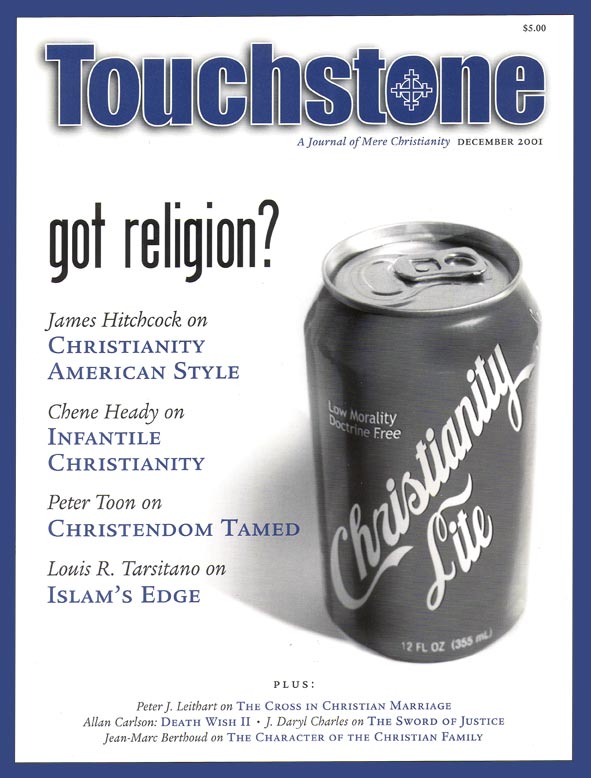Death Wish II
Euthanasia, the Second Time Around
by Allan Carlson
Euthanasia, or “mercy killing,” has twice been an issue in the recent history of our common Western civilization: the first time, about three generations ago; and the second time, over the last 20 years. While there are certainly differences between these two episodes, I am more interested at this point in their similarities. The common features are three: (1) a shift in medical ethics brought on by leaders in the medical profession itself; (2) the dominance in public life and policy of an ethos that sees death as a positive instrument for progress; and (3) the linkage of mercy killing to economic gain or good business.
The first euthanasia episode emerged in the 1920s, as an adjunct to the eugenics campaign. “Racial improvement” stood at that time as a certified science, in America as in Europe. Professors of eugenics took posts in many prestigious universities, with the goal of improving the racial stock by encouraging the genetically “fit” to reproduce and by discouraging the so-called unfit from having children. Laws for the forced sterilization of these “unfit”—usually defined as the mentally ill, chronic alcoholics, epileptics, and persons with physical defects—enjoyed particular popularity in the United States. Indeed, experts saw the California law as the most progressive, a model of applied science devoted to “the public good.”
The same impulse emerged in Germany as well. In 1920, the prominent jurist Karl Binding and the distinguished psychiatrist Alfred Hoch published a book entitled (in translation) The Release of Life Devoid of Value. The volume described those “absolutely worthless human beings” held in psychiatric institutions and asylums for the retarded who had “neither the will to live or die” and “whose death is urgently necessary.” The book labeled these poor souls a vast army of “ballast existences,” outlined how a euthanasia program could be organized, and emphasized the financial economies to be gained.
These views, I hasten to add, were not those of cranks or cruel thugs. These judges, doctors, and scientists were leaders in their fields, progressives, self-styled “modernists,” who sought to apply the successful techniques of industry and the values of efficiency and cost-accounting to questions of healing, life, and death. They rejected the old, “discredited” Christian principle of “the sanctity of human life” in favor of a rational measure of utility, and a readiness to relieve suffering at any cost.
Turning to a personal example, let us examine the work of Dr. Paul Nitsche, director of the Dresden Psychiatric Hospital and a pioneer in various forms of progressive therapy. During the 1920s and 1930s, he and his colleagues worked to develop new psychiatric drugs and innovative methods of counseling and work therapy. Nitsche was also a leader in introducing to central Europe electroconvulsive shock and insulin therapy as putative cures for mental disease. As one historian explains, “Nitsche . . . maintained that for every disease there must be a therapy; euthanasia became the therapy for those judged incurable. . . . Healing and killing went hand in hand” (Proctor). This was progressive medicine, freed from “irrational” Christian restraints, and committed to efficiency and to the prevention of pain.
Willing Partners
This broad shift in medical ethics toward a utilitarian measure of life—“is it useful?”—soon found a willing political partner. In a speech given in August 1929, the struggling politician Adolph Hitler said:
If Germany was to get a million [new] children a year and was to remove 700,000–800,000 of the weakest people, then the final result might even be an increase in strength. . . . As a result of our modern sentimental humanitarianism we are trying to maintain the weak at the expense of the healthy.
Hitler, of course, did come to power four years later, but on the euthanasia front, he moved cautiously. He feared possible negative reactions by the Christian churches within the Reich. The National Socialist government did approve a measure for the Prevention of Hereditarily Diseased Progeny on July 14, 1933. Modeled on the law of California, it led to 350,000 forced sterilizations over the next five years. The legalization of “mercy killing” would take more time; public opinion had to be softened first.
Allan C. Carlson is the John Howard Distinguished Senior Fellow at the International Organization for the Family. His most recent book is Family Cycles: Strength, Decline & Renewal in American Domestic Life, 1630-2000 (Transaction, 2016). He and his wife have four grown children and nine grandchildren. A "cradle Lutheran," he worships in a congregation of the Lutheran Church-Missouri Synod. He is a senior editor for Touchstone.
subscription options
Order
Print/Online Subscription

Get six issues (one year) of Touchstone PLUS full online access including pdf downloads for only $39.95. That's only $3.34 per month!
Order
Online Only
Subscription

Get a one-year full-access subscription to the Touchstone online archives for only $19.95. That's only $1.66 per month!
bulk subscriptions
Order Touchstone subscriptions in bulk and save $10 per sub! Each subscription includes 6 issues of Touchstone plus full online access to touchstonemag.com—including archives, videos, and pdf downloads of recent issues for only $29.95 each! Great for churches or study groups.
Transactions will be processed on a secure server.
more on medicine from the online archives
more from the online archives
calling all readers
Please Donate
"There are magazines worth reading but few worth saving . . . Touchstone is just such a magazine."
—Alice von Hildebrand
"Here we do not concede one square millimeter of territory to falsehood, folly, contemporary sentimentality, or fashion. We speak the truth, and let God be our judge. . . . Touchstone is the one committedly Christian conservative journal."
—Anthony Esolen, Touchstone senior editor










